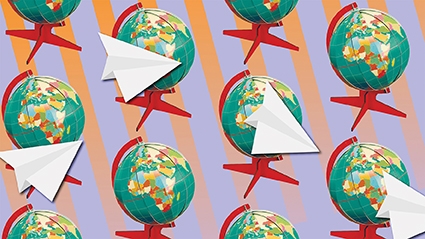Multiple Citizenship for the Global Good
Op-ed
I have always wanted to be a citizen of the world, something which would allow me to live beyond any political borders as a member of not one particular nation, but as part of humanity as such, with certain permissible rights and voluntary responsibilities – all to the benefit of Mankind. On the other hand, global citizenship is only a symbolic international image, which is impossible to enjoy without one’s own specific citizenship (meaning a person’s lawful recognition by a sovereign state as its subject).
Perhaps, some day in the unknown future, global citizenship could become the only citizenship status that one needs in order to enjoy certain benefits or trot the globe. But right now, the world is as divided and disparate as ever, with almost 200 officially recognized countries on the planet, each of them with its own citizenship rules and regulations. As such, the widely used adage ‘it’s a small world’ is not exactly relevant when it comes to the multiplicity of a citizenship status in the modern context. In most cases, people have the citizenship of only one country, because numerous countries do not allow multiple citizenship status. Yet, in the current process of globalization, dual and even multiple citizenship is gradually becoming acceptable.
I find it a little strange that most countries that permit dual citizenship still may not recognize the other citizenship of its nationals. For instance, a passport of a certain country would read that dual nationality may hamper efforts to provide consular protection to dual citizens in the foreign country of their other nationality. This vague comment is somewhat confusing and scary because, in case of some consular debacle, one might be torn apart between the legislative interpretations made by two different countries.
The world needs to make efforts to clarify the grey areas of multiple citizenship as we are today living in a fast and intensively changing world, and new ways of life are dictating the necessity of more optimal rules for better international communication. Why shouldn’t dual citizenship be easily acquirable by anybody who wants to have it? Right now, citizenship status is a purely national prerogative, defined exclusively by local law: there is no international convention which determines the nationality or citizenship status of a person.
Georgian law makers are currently working on a bill of law to regulate the Georgian citizenship status to include dual and multiple, and this is clearly welcome. I heard from one of our parliamentarians that the dual citizenship status might very well help Georgia in keeping close to our national bosom those people who for various reasons at different times have left the country and adopted the citizenship of other nations. It might also help to somehow neutralize the wicked Russian passportization policy in our occupied lands. There will be other considerable benefits too.
Meanwhile, citizenship status in general, and Georgian citizenship in particular, remains a matter of huge importance, suggesting rights, duties and benefits at the same time. Rights, for example, would include freedom to cross the border at any time, to live and have employment, participate in an electoral process and aspire to public office; duties would be just as numerous: regular payment of taxes, service in the army, participation in jury trials if such functions in the country, support and defense of the main law of the land, observation of local laws, respect for rights and beliefs of other people. The benefits would also be impressive, like consular protection and safety from deportation, guaranteed citizenship for children, permanent and undisputed ownership of land, etc.
Personally, I would love to have dual citizenship if the law of both countries – Georgia and America – legally allowed me to use it to the best of my advantage as well as to the benefit of both nations. As a matter of fact, a multiple citizenship could also turn out to be one of the strongest prerequisites of peace in the world and for faster development of international cooperation, because one and the same person with multiple national belonging would take better care of the world, identifying himself or herself with not only one nation but many, and taking their problems closer to heart.
Nugzar B. Ruhadze











